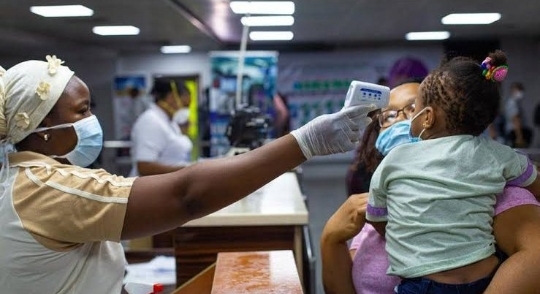COVID-19: Nigerian Health Workers Call For Better Conditions

With the coronavirus pandemic spreading, the question of whether public health workers are at increased risk has become a global challenge.
Those working on the frontlines and taking care of patients—nurses, doctors, lab technicians, among others, are at greater risk of contracting a virus that has no cure yet.
In the season of coronavirus (COVID-19), healthcare workers are raising their voices to denounce poor working conditions, especially as many have died on the frontline.
The numbers of grievances stack higher—lack of ventilators, test kits, face masks, sanitizers, gloves—the list grows. Globally, public health workers sound the alarm.
While Nigeria has yet to record any casualties, no fewer than 47 healthcare workers have died in Italy and Spain, while battling to save lives in the COVID-19 fight.
In Italy 41 have died, while six healthcare workers have also lost their lives in Spain.
The leadership of Nigerian Medical Association is already expressing worry for the safety of its members as the number of COVID-19 infections climb in the country.
In a recent interview, Dr Francis Faduliye, the President of Nigerian Medical Association (NMA) said it would be unfair for health workers to lose their lives due to the lack of government support for the healthcare system.
“Many of our hospitals do not have the necessary Personal Protective Equipment (PPEs) for the health workers to treat patients.
“We don’t want any of my members to die due to negligence of the government in providing the necessary equipment for them to treat patients.
“If you look globally, many health workers have died while taking care of patients. We need to find ways that we do not have any unnecessary deaths amongst us,” Faduliye stressed.
Dr. Sunday Usende, a healthcare expert, spoke to HumAngle about Nigeria’s steep learning curve in prioritizing the safety of healthcare workers, especially during pandemics.
“It is important to note the varying levels of preparedness of various nations for a pandemic of this magnitude.
“A country like Nigeria, whose healthcare system is struggling, is very vulnerable because it is largely unprepared.
“I’ll consider the last success in the containment of the Ebola virus outbreak as sheer luck. Of course, I give credit to the frontliners who gave their lives to contain the virus at the very outset.”
In times of crisis, they are often the ones putting their lives at risk to save others, Usende said.
“Other countries have increased the wages of the doctors and allied health workers but here we are pleading for face masks, gloves, hand sanitizers to be available in the hospitals,” Usende said.
He said the unequal allocation of governmental resources divided health workers.
Usende noted that the pattern of resource distribution was such that staff members of Nigerian Centre for Disease Control (NCDC) who administer tests on patients received more than health workers treating confirmed cases in hospitals.
“My medical director has been pleading to no avail to authorities to make PPEs available as our facility is situated at the border of the state where there are higher chances of contacting patients with the virus coming in from hot zones,” he said.
This stresses the need to prioritize the protection of health workers at all levels, especially in the primary healthcare centres.
“If this matter is not given due consideration by the health authorities, the hospitals may as well become the focus for spread of the coronavirus, even with the lockdown which would jeopardize every other ongoing effort,” Usende cautioned.
He added that Nigeria already had a shortage of health professionals that must attend to 204 million people.
Usende also said that PPEs be made available to hospitals and even given at an affordable rate, and that workers be given proper training that would safeguard them against diseases.
Support Our Journalism
There are millions of ordinary people affected by conflict in Africa whose stories are missing in the mainstream media. HumAngle is determined to tell those challenging and under-reported stories, hoping that the people impacted by these conflicts will find the safety and security they deserve.
To ensure that we continue to provide public service coverage, we have a small favour to ask you. We want you to be part of our journalistic endeavour by contributing a token to us.
Your donation will further promote a robust, free, and independent media.
Donate HereStay Closer To The Stories That Matter




